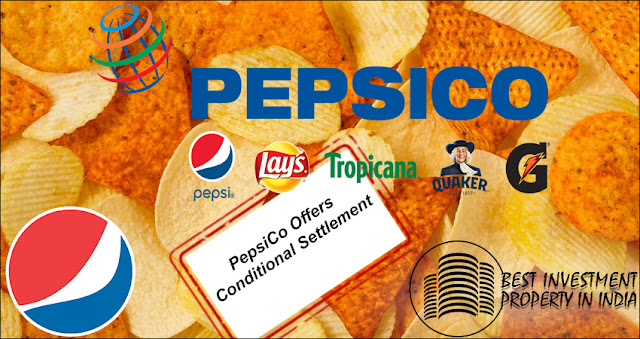The story so far : A David versus Goliath story has played out in Gujarat over the last month,with food and beverages giant Pepsi Co dragging potato farmer to court for allegedly growing its registered potato variety used to make 'Lays' chips. Four small farmers from sabarkantha district were sued ₹1.05 crore each, although they cite a law allowing them to grow and sell even registered plant varieties. Faced with growing social media outrage, boycott calls from farmers groups and condemnation from major political parties,the company finally agreed to withdraw cases after talks with the Gujarat government.
When was the variety introduced?
Pepsi Co introduced, in 2009, the FC5 variety of potato that it used to make it popular 'Lays' potato chips to India. The potato variety is grown by approximately 12,000 farmers who are a part of company's collaborative farming programme, wherein the company sell seeds to farmers and has an exclusive contract to buy back their produce. In 2016 the company registered the variety under the Protection of Plant Varieties and Farmers'Right Act, 2001(PPV&FRA).
Finding the farmers who were not part of its collaborating farming programme were also growing and selling potatoes of this variety in Gujarat, Pepsi Co filed rights infringement cases under the Act against some farmers in Sabarkantha, Banaskantha and Aravalli district in 2018 and 2019. Farmers allege that the company hired a private detective to pose as potential buyers, take secret video footage and collect samples from farmers' fields without disclosing its real intent.
What is the farmers' stand?
The ₹4.2 crore lawsuit against four small farmers in Sabarkantha district was heard by an Ahmedabad commercial court on April 9,and an ex-parte injuction ordered against the farmers. However, farmers' rights groups across the country began a campaign against Pepsi Co requesting the Protection of Plant Varieties and Farmers' Rights Authority to intervene in the case and bear the farmers' legal costs using the National Gene Fund. At the April 26 hearing, the company offered an out-of-court settlement to the farmers on the condition that they give an undertaking not to grow the registered variety and surrender existing stocks or to join its collaborative farming programme.
Demanding an unconditional withdrawl of cases, farmers union affiliated to the ruling Bhartiya Janata Party(BJP) as well as the Left parties joined in boycott calls against Pepsi Co products and stoked outrage on social media as well. In the midst of an election season in which agricultural issues are in the spotlight, senior political leaders from the Congress and BJP added their criticism. On April 27 ,the Gujarat government announced that it would back the farmers and join the legal case on their behalf, although it was working toward an out-of-court settlement. Finally, on May 2, Pepsi Co agreed to withdraw all nine cases after discussions with the government.
What is the legal basis for the suit ?
Both Pepsi Co and the farmers cite the same Act to support their opposing positions. The PPV&FRA was enacted in 2001 to comply with the World Trade Organisation's Agreement on Trade- Related Aspects of Intellectual Property Rights.
Pepsi Co based its suits on Section 64 of the Act dealing with infringements of the registered breeder's rights and subsequent penalties.The farmers' legal case depended on Section 39 of the Act, which allows the cultivator to ''save ,use,sow,resow,exchange, share or sell his farm produced including seed of a variety protected under this Act '' with the sole exception of branded seed. As this section begins with the words ''Notwithstanding anything contained in this Act ....'',farmers claim their rights have precedence.
Over the last decade, more than 3,600 plant varieties have been registered under the Act, with more than half of the registration certificates going to farmers themselves. This was the first case of infringement of rights under the Act, according to the central agency set up to implement the Act.
Who are the stake holders and what are the stakes?
''The company is harassing us . I am not a crorepati, I cannot afford to pay these damages they want,'' says Haribhai Patel, who owns 4 acres and was sued for ₹1.05 crore. He claims he bought potato seeds locally, and is within his rights to grow and sell any variety. Even Pepsi Co supporters admit that they lost the perception battle by dragging small farmers to court for large sum in election season.
However, some of the farmers sued in 2018 seem to be large players with bigger stakes in the game. Fulchand Kachchhawa reportedly owns over 150 acres of land, as well as cold storage facility, and is a potato grower and trader selling much of his produce to 'Balaji Wafers ',the major regional competitor of 'Lays' chips. It is alleged that he sells the registered variety of seeds to smaller farmers and buys their produce as well. It is unclear whether his activities would be protected under Section 39 of the PPV&FRA.
Pepsi Co says its collaborative farming programme and registered variety rights are under threat. While 'Lays' claims to ba leader in the country's ₹5,500 crore potato chips market,regional players are eating into the market share.
Farmers rights group such as the Alliance for Sustainable and Holistic Agriculture saw the issue a test case on farmers rights in India under the WTO regime, and warned that a bad precedent could hurt farmers of the other crops and endanger the country's food sovereignity.
What happens next?
While farmers have claimed victory, they also demanded an apology from Pepsi Co and plan to sue for compensation for ''harassment'' by the company. They are also wary of any future government -facilitated negotiations on seed protection and right of breeders. Pepsi Co 's decision to withdraw the cases ''backed by an assurance from the government for a long term amicable settlement'', according to sources familiar with the development, who added that both the Gujarat government and the Centre were involved in that assurance for further talks.












0 comments:
Post a Comment